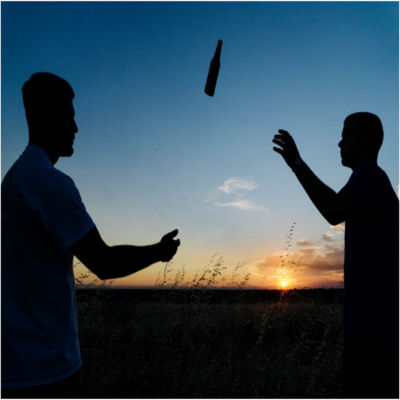Other Alcohol-Related Crimes in Alaska
Other Alcohol-Related Crimes in Alaska

Are there other crimes related to alcohol in Alaska?
Yes. Some other alcohol-related crimes are described here. Most of these crimes are Class A misdemeanors. A misdemeanor is a less serious crime than a felony, but a Class A misdemeanor is the most serious kind of misdemeanor. For more information about classes of crimes and the range of penalties. See the definitions in glossary guide.
- Contributing to the delinquency of a If you are 19 years old or older and you encourage or help anyone under age 18 to do any act that is against state law, such as drinking alcohol, you may be charged with contributing to the delinquency of a minor. Even if you are younger than 19, but you are emancipated or otherwise legally entitled to be treated as an adult, you could be charged with this crime.
- Furnishing If you give or deliver an alcoholic beverage to a person under 21, you may be charged with this offense.
- Minor in possession; minor consuming. If you are under 21, and you drink or possess alcohol, you may be charged with this If you have previous convictions, the charge may be more serious.
- Purchasing or delivering to a person under age of If you are under 21, you have broken the law if you:
- buy alcohol for yourself or for someone else;
- ask another person to buy alcohol for you or someone else;
- influence another person to give alcohol to an underage person by falsely stating that person is 21 or older;
- buy or receive alcohol for the purpose of delivering it to someone under 21;
- give false information about your age to obtain alcohol.
The penalty for breaking this law varies. But in addition to any criminal penalty, you may have to pay a civil penalty of $1,500 plus costs and attorney fees to any establishment where you got the alcohol illegally. You are entitled to be told in advance in writing if anyone is asking the court to order you to pay this penalty.
- Refusal to Submit to an Alcohol Test after If you are arrested for DUI, you will be asked to take a test to analyze the amount of alcohol in your system. Under Alaska law, if you have a driver’s license, you have already agreed to take a test for intoxicants if you are arrested for DUI. Therefore, you must give a sample of your breath or blood for alcohol testing. Refusing to give a sample is as serious an offense as the DUI itself. It has similar mandatory penalties. In fact, you can be convicted of both DUI and refusal to take a test. You could then get two sentences, one added to the other.
- Open A person may not drive when there is an open bottle or can or other vessel containing alcoholic beverage in the passenger compartment.
- Local option Selling alcohol without a license is a class A misdemeanor with a ten-day mandatory minimum sentence. Alaska law also lets communities decide if they want to limit alcohol sale and possession. If you bring alcohol into a community that has elected to limit alcohol, and you plan to distribute the alcohol to others, you may be charged with a felony. The penalties increase depending on the amount of alcohol involved.
What should I do if I am charged with an alcohol offense?
Section 1 of this Guide describes your rights if you are stopped, searched, or arrested by a police officer for any kind of crime. Here is a summary of what to do if you are stopped, searched, or arrested for an alcohol-related crime.
- Be polite and respectful to the police officer but don’t provide evidence against yourself by trying to explain or provide The police are there to collect evidence of crimes, and they may not be sympathetic to you at all.
- Don’t make matters worse by hiding evidence, lying, resisting arrest, or trying to get anyone else to change their story to help you These actions are additional, separate crimes of tampering with evidence, providing false information to the police, resisting arrest, assault, or witness tampering.
- Listen carefully to warnings you are If you are arrested, you should be warned that anything that you say can and will be used against you in a court of law. You should be informed that you do not have to answer questions until a lawyer is present and you can have a lawyer appointed for free if you cannot afford one. Protect your rights by telling the officer clearly that you want your rights – this is called “invoking your rights.” Remain silent until you talk to an attorney.
- Even if you aren’t warned, know your You do not have to talk to the police except to give your name and identifying information. Ask for a lawyer. Ask to make a phone call so that you can call someone to help you to set up bail so you can get out of jail.
- Consult a lawyer as soon as you Even if you decide not to keep the lawyer, you are better off knowing what exactly is charged, what possible legal defenses exist to help your case, what evidence has been collected, whether you can get a good deal from the prosecutor, and if you are better off going to trial or taking a deal. A lawyer can tell you whether it is possible to keep evidence from being presented in court that might otherwise cause you to be convicted.
- If the police release you (let you go), carefully follow your release If you don’t follow all the conditions of your release (which may include not leaving town, or other conditions), you are committing the additional crime of violating conditions of release.
What if I tried to commit an alcohol offense but didn’t succeed?
If you try to commit a crime such as purchasing alcohol when you are underage, but don’t succeed, you have committed an offense anyway. An attempt to commit an offense is also an offense. It is usually one step below the seriousness of a completed crime.
If you are charged with trying to commit an alcohol-related crime, the prosecutor would have to prove that you intended to commit the crime, and took a substantial step towards committing the crime; in other words, that you definitely tried to commit the crime. If you are under 21, and you tell police that you tried to buy a bottle of gin but the store would not sell it to you, you have confessed to an attempt to possess alcohol. Your statement would be a confession that the prosecutor can use to prove your guilt at a trial. The clerk at the store could also testify that he or she refused to sell you a bottle because you looked too young. The police could find out your age from your license, or birth records, or your parents. This evidence together is likely to be accepted as proof beyond a reasonable doubt that you attempted to possess alcohol while underage in violation of the law.



